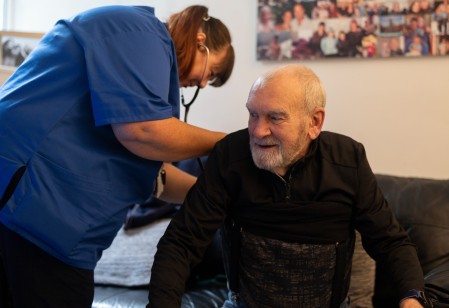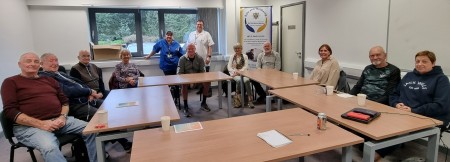Supporting patients with Interstitial lung disease and respiratory conditions
Meet Ellie Kingston, Respiratory Nurse
Respiratory Nurse Ellie Kingston describes the Pulmonary Fibrosis support group she manages for the Interstitial Lung Disease service is a ‘labour of love’. She set the group up around 18 months ago, after initially being all ready to launch just before Covid struck which put everything on hold. The group meets once a month in Bishop Auckland and is one of only two groups in the North East region offering this form of unique support for those with fibrosis.
Ellie’s been a nurse for over 35 years, joining the Respiratory Team at CDDFT around 8 years ago. Previous to this she worked as a nurse at Saint Theresa’s Hospice in Darlington where she helped to set up her first support group for people with the respiratory disease.
She realised that patients with respiratory issues didn't access the Hospice at all and thought a lot of people were being missed that could be supported. Ellie got in touch with the respiratory nurse in CDDFT at time who agreed to help provide some support and education for respiratory patients to keep them as fit as possible for as long as possible.
The group proved very successful and patients who didn't routinely access Hospice services began to come for counselling, family support and the inpatient unit, including family members and carers.

I’ve been told I’m a good communicator and I'm a good listener, that’s my forte. I think is something that's fundamental key to caring for people. My mum was a trained counsellor she was a ward sister so I was kind of used to the psychology very from early on and I think when you've been brought up in that environment it’s almost natural .
“It's my passion palliative care because we've got we've got one chance to get it right. I think that's a basic right of every human being, to die with dignity, pain free and comfortable surrounded by everybody who love you if possible..
Ellie was able to care for her mum who died of lung cancer in the Hospice after which she though it was time for a change so accepted an offer to become a Respiratory Nurse with the Trust
The ILD support group is specifically to support people with interstitial lung disease - otherwise referred to as fibrosis. Over the past 18 months it has grown slowly with referrals starting to come in from consultants who give out information at clinic about the group.

Ellie sees most of those attending the group regularly as their respiratory nurse either in their homes or at clinic but the monthly support group provides an opportunity for everyone to meet and discuss common issues.
The group works closely with a charity called Action for Pulmonary Fibrosis who are at the forefront of research in this UK and provide a lot of support. They often send speakers to the group and can offer grant support and also information on new trials and information that might be helpful.
“Some of our respiratory patients can be extremely breathless for many years living with that symptom burden every day,” says Ellie. “There’s a lot of stigma around chest disease linked to smoking which is often seen as being the patient’s own fault.”
But Fibrosis actually isn't usually linked to smoking, but it can be. It’s a scarring of the lungs and often there isn’t a known cause. Some causes could be due to other medical conditions, occupational causes, medications and viruses, COVID being the latest of course that we know is impacting on Fibrosis cases.
“We do see fireman coming to us with chest conditions because of things they’ve inhaled and smoke,” adds Ellie “Or joiners or people that have worked with sawdust, farmers working with cattle which can be quite bad for your lungs – I’ve seen quite a few vets that have got fibrosis. You would think it working outside would be ok but there’s chemicals involved with farming, and then there’s the clouds of dust they could be driving through all day to get the harvest in. Feather dander can impact on your chest, so people that have kept pigeons or birds can be at risk.”
The Interstitial lung disease support group meets every month in Bishop Auckland. For more information contact Ellie Kingston on eleanorkingston

